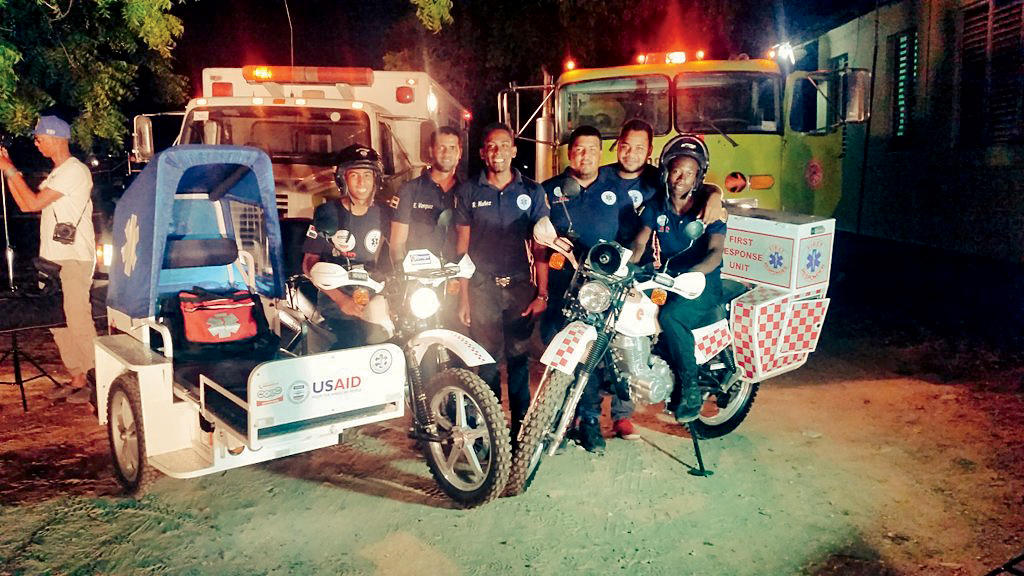When Jason Friesen ’12PH enrolled in the executive master’s program at Columbia’s Mailman School of Public Health in September 2010, he had a vision for a health-care nonprofit that had huge potential but needed a little fine-tuning.
A year earlier, Friesen, then a paramedic in San Diego, had founded Trek Medics International, an organization that set out to donate emergency medical equipment, including ambulances, to developing countries. But while volunteering in Haiti after the 2010 earthquake, Friesen realized that the needs of poor communities — which have few hospitals, no formal system of emergency care, and mostly unpaved roads — were more complex. “The problem wasn’t a lack of equipment,” says Friesen, “but of infrastructure.”
The emergency medical system that Americans take for granted — including 911 dispatchers and networks of first responders — doesn’t exist in many countries. As a result, car accidents, complicated births, heart attacks, and other sudden illnesses are more likely to be fatal. But to replicate our system, “you’d need lots of money and really good roads everywhere,” Friesen says. “The question was, what could we do instead?”
Friesen thought he had the answer. He wanted to recruit local volunteers, train them in first aid, and dispatch them to emergencies via a text-messaging system — in effect, crowdsourcing an emergency-response network. The volunteer first responders — on foot, bicycles, motorcycles — could provide emergency care at the scene and, if more treatment was needed, summon other volunteers to transport the patient to a hospital.
“In these countries, you can’t send an ambulance to every scene,” Friesen says. “But everybody has a cell phone, and a guy on a motorcycle can get there quickly, stabilize the patient, and treat any immediate life-threatening conditions — by, for example, stopping a hemorrhage or keeping an airway open.” With better communications and a little medical training, he thought, many lives could be saved.
Friesen headed to Mailman, hoping to hone his mission and get valuable management experience. Soon after enrolling, he accepted a post as the director of an international health-care organization in Haiti, which meant commuting from Port-au-Prince to New York (classes in the executive program meet for one long weekend a month).
Columbia proved to be a “great incubator” for Trek Medics and provided a crash course in how organizations work, he says: “We’d study a concept in class, and the next week I’d be in Haiti implementing it.”
Friesen also struck up a friendship with classmate Kevin Munjal ’12PH, an emergency physician at Mount Sinai Medical Center and a pioneer in community paramedicine, a new model in which EMTs provide more care on scene, rather than transporting every patient to an ER. Munjal agreed to be the medical director of Trek Medics. Its new motto: “911 where there is none.”
Today, Trek Medics International has helped to establish networks of volunteer first responders in several communities in the Dominican Republic and Tanzania. Local health organizations generally recruit and train the volunteers, many of whom are compensated with free cell-phone service, while Trek Medics provides the open-source, text-message-based dispatching platform called Beacon. The communication system, which can be used on any mobile phone, with or without an Internet connection, was designed with funding from Google and the cloud communication company Twilio. Trek Medics also got a boost from the Columbia Startup Lab, which provided office space in SoHo, and from Columbia Business School’s Tamer Fund for Social Ventures, which awarded the nonprofit a $25,000 grant.
To date, volunteers have responded to some one thousand emergencies and provided more than seven hundred potentially life-saving trips to hospitals.
A key to Trek Medics’ success, Friesen says, is that he and his small staff find creative ways of adapting their services to suit local circumstances. For instance, in Mwanza, Tanzania, Trek Medics helped recruit the drivers of the city’s ubiquitous motorcycle-taxis, called boda-boda, to be first responders. In Puerto Plata, Dominican Republic, Trek Medics simply shared their dispatch technology with an existing group of volunteer EMTs and firefighters.
“Trek Medics goes out of its way to make efficient use of local resources,” says Meghan FitzGerald ’05PH, a partner with the private-equity firm L1 Health and an adjunct professor at the Mailman School who serves on the nonprofit’s board. “Jason’s approach is not a helicopter drop or Band-Aid fix but rather a solution empowering local health-care providers to work with technology and help their own.”



